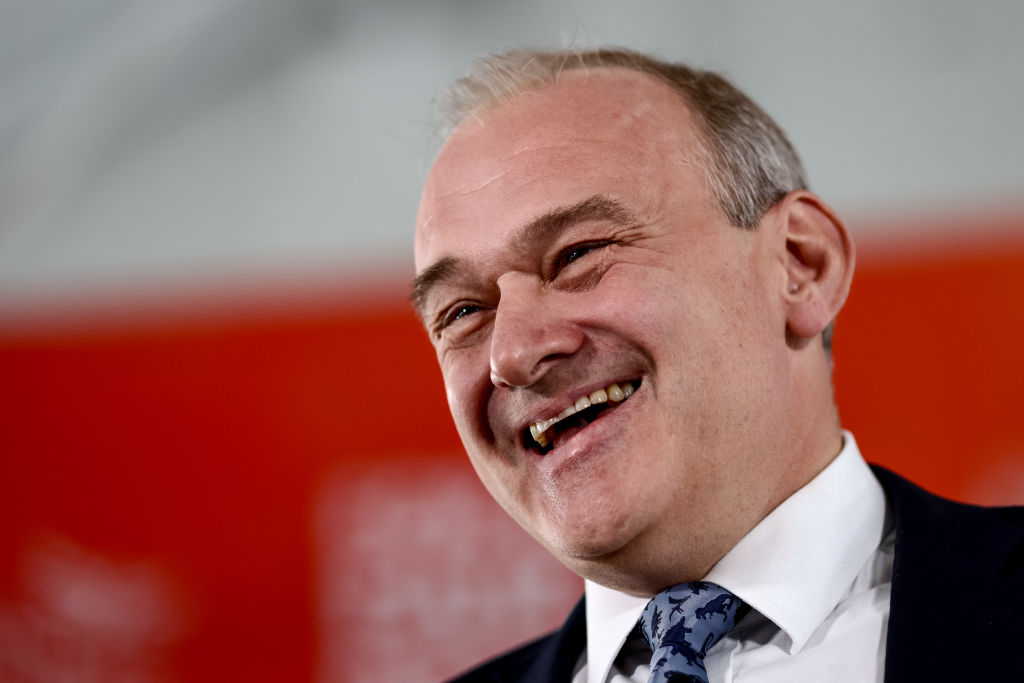Sir Ed Davey kicked off manifesto week by launching his party’s document this afternoon in East London. In true Lib Dem style, it is a weighty tome of 114 pages – the product of months of painstaking care by party strategists. Their task was to reconcile the desires of the activist base with the demands of Tory voters that the leadership is trying to woo across the South of England. ‘We are a genuine party democracy – sadly’, joked one of Davey’s aides to me at last year’s conference. That tradition means that, unlike the Conservatives, the Lib Dem document cannot be cooked up in a matter of weeks and take little account of their grassroots’ demands.
There is a potential for conflict between the Lib Dem platform and the kind of ‘Blue Wall’ voters it is hoping to entice
The task then was twofold: being careful not to spook true-blue Tories while giving Lib Dem members a reason to keep enthusiastically knocking up doors. The manifesto thus included the usual talk of proportional representation, votes at 16, 0.7 per cent international aid alongside the party’s century-old mission of reforming the House of Lords. There was plenty of Tory-bashing too, in proof, if it was ever needed, that the party has abandoned equidistance: the document contains 45 mentions of the Conservatives and just one for Labour.
More controversially, there is also a pledge to take the UK back into the EU single market. The inclusion of such a promise is understandable for anyone who has attended packed-out pro-EU fringe events at various party conferences. But it shows how relaxed the Lib Dems now are in being portrayed as anti-Brexit, despite being crushed at the last election on a ‘rejoin’ platform less than five years ago. Given that much of the party’s strategy is now based on winning Leave-voting seats in the south-west of England, this pledge suggests they are confident that issues like the NHS, cost-of-living and sewage are now much more prominent in the minds of voters than Euroscepticism and the 2016 referendum.
Brexit might be less popular than it was five years ago – but low taxes certainly aren’t. It is therefore striking that the Lib Dem manifesto includes ‘a massive tax raid on Britain’s wealthiest people,’ in the words of the Financial Times, in order to fund an additional £27 billion in spending. The most eyebrow-raising manifesto measure is a plan to raise an extra £5.2 billion from capital gains tax (CGT), with a new rate of 45 per cent for gains of more than £100,000 and 40 per cent for gains of between £50,000 to £100,000. There are higher levies too on frequent flyers and private jet travel alongside further taxes on the usual rogue’s gallery of political villains: banks, digital services companies, oil firms, tobacco companies and polluting water companies.
There is an obvious potential for conflict here between the Lib Dem platform and the kind of ‘Blue Wall’ voters it is hoping to entice on 4 July – such as in Surrey where Jeremy Hunt can plausibly claim that earning £100,000 ‘doesn’t go as far as you might think.’ It is notable that Labour is being far less avowedly pro-tax than the Lib Dems – despite Keir Starmer’s median target voter being less wealthy than that targeted by Ed Davey. Just this morning, Starmer refused to say whether he will increase CGT, a policy now being enthusiastically championed by his Lib Dem counterpart. Davey’s team will just hope that their candour on tax is rewarded by voters.








Comments